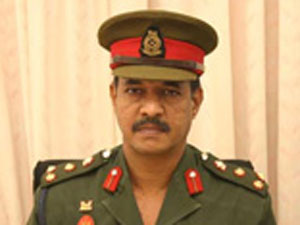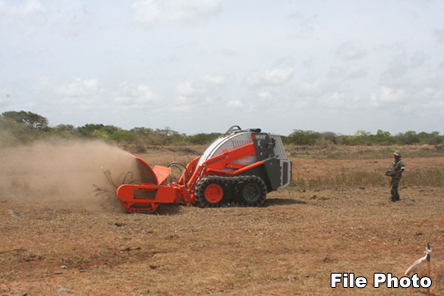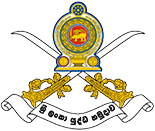 MILITARY spokesman Brigadier Udaya Nanayakkara briefed the Daily Mirror on the role of the Sri Lanka Army in the post conflict scenario, recruitment for the army in the future and the various allegations which have been made against the army.
MILITARY spokesman Brigadier Udaya Nanayakkara briefed the Daily Mirror on the role of the Sri Lanka Army in the post conflict scenario, recruitment for the army in the future and the various allegations which have been made against the army.Q: What is the role of the Sri Lankan Army in the post conflict scenario?
In the post conflict scenario, the army has a tremendously important role to play especially in assisting the government in post-war development work. The first major task is the de-mining process. There are over a million mines in those areas; there are no records [of where the mines have been laid] and there are no identifiable patterns of mine-laying. We will have to consider that each and every inch of the land is being mined and ensure that the whole area is de-mined before the resettlement of IDPs. De-mining has become a daunting task for the army. A separate contingent of army engineers have been deployed on de-mining tasks. Attention is also needed in the repair and reconstruction work on roads, bridges, and irrigation tanks and also in the provision of infrastructure facilities. Because of the war which was spread over the last 30 years, there has been no development work in these areas. We also didn’t have time to train our troops in the skills needed and as a result had to conduct professional training programmes for the troops. But, we also had to recognize the need for our troops to have a break because they were completely involved in offensive operations especially in the Jaffna peninsula and the Vanni.

Q: You mentioned the de-mining process. It is believed that 70% of the de-mining has been done by the Sri Lankan Army. How do you intend to proceed in de-mining the rest of the area?
It’s not possible to give exact figures. There are certain areas that are used for agricultural purposes. Then there are the major roads leading to the Jaffna peninsula. The 70% of the area de-mined represents essential areas connected with the resettlement process. Among the major areas identified are roads [leading to the resettlement areas], the areas ear marked for resettling IDPs, and land in paddy and other agricultural produce. We also have the tanks which we are to renovate. We have prioritized these areas and according to those priorities 70% of them have already been completed.
Q: You spoke of re-training the soldiers. Are you planning on opening new training schools or acquiring the services of foreign trainers?
No, we don’t have plans of having training schools or engaging foreign trainers. Our soldiers are conversant with many trades and bear varied skills. You name it; we have it. The army should be able to operate independently, and to achieve that independence, we have in our ranks men with various types of skills. And, we can sharpen their skills by training them according to army standards set out in our training programmes. Because of the offensive, there was little opportunity for such training. Now there is no need to conduct any offensive operations but we are yet on a defensive role–so we need more time.
Q: You mentioned how involved the soldiers are now in the development process of the North. So here one sees a shift in the mind sets of the soldiers; from being in protective roles to roles in administration. How do you see the soldiers dealing with this change?
Due to our culture, the average Sri Lankan can fit into any kind of scenario in any kind of environment. Our soldiers are cultured like that. They are not just carrying out instructions given by the hierarchy. They are educated and at the same time they could do some work using their own initiatives. Though they were completely on offensive operations, there is no necessity that they undergo training or counselling to fit into the post-war scenarios, like other armies do. Because of their family backgrounds and the way they were associating with society they can fit into any kind of environment. But if there are a few individuals who could not adjust to this change, our officers are trained to identify such army personnel and offer them counselling so that they’ll be able to perform jobs in any other environment other than in offensive climates.
Q: In the recent past there have been a number of accusations against the army especially from the US. At one point, Secretary of State Hillary Clinton said that rape had been used as a weapon of war. Recently the US State Department submitted to Congress a report on various war crimes said to have been committed by the Sri Lankan Army. As someone from the army, how do you respond to these allegations and how do you see these accusations made by the international community?
This is not the first time such accusations have been levelled against us. During the offensive over the past three years, there were many accusations against Sri Lanka. Forgetting that the Sri Lanka Army is the only army in the world that rescued over 300,000 people from the clutches of a terrorist organization–the LTTE–with a minimum number of causalities, we were accused of human rights violations. Our instructions were to destroy the enemy with zero causality to the civilians. We carried out our operations accordingly, and not a single human rights violation has been reported by the evacuees. You can check with these civilians none of whom complained about any human right violations [on the part of the Sri Lankan Army]. Our troops have even sacrificed their meals for the sake of these civilians. Our women soldiers helped deliver babies of pregnant women amongst the evacuees. Humane assistance of various kinds and facilities were provided to the evacuees who were mistreated during their time with the LTTE. We have carried out investigations at the divisional and sectional levels and found that these allegations were false and were made merely to tarnish the good work carried out by the Sri Lankan Army.
Q: The issues surrounding the Chief of Defence Staff, General Sarath Fonseka has sparked some controversy in the past few weeks. There also has been speculation about his entry into politics. What would you say from the point of view of the army, on the subject?
We have made our stand clear on this matter. Be it General Fonseka or any other person in the military, as long as someone is in the army he can’t enter politics. But if you decide to leave the army, then that person can enter politics.
Q: Is this due to legally biding agreements between the army and a soldier or is it on ethical grounds?
There is a legally binding agreement and it is also on ethical grounds.
Q: Now that the war is over, what has been done to address the psychological needs of the soldiers since they have to shift their mindsets from an offensive role to a defensive role? Recently there were reports of how a soldier had blown up a school bus full of children.
We have experienced such issues and as I said before this was due to personal disputes. Just because an individual in the army does something disagreeable, it’s not a problem faced by the entire army. It is a pyramid like organization and at every level you have a person who will take responsibility and is accountable for these people. As such, at each of these levels we have made necessary arrangements for their education. The majority of the incidents which were reported to the effect that army soldiers were involved, those responsible had deserted the army some time back. These individuals used the military training they have received to harm civilians. We have made necessary arrangements to arrest these deserters and deal with them.
Q: How will the Sri Lankan Army assist in the global war on terror?
The same situation that was prevailing in Sri Lanka is prevailing in Haiti. And with our experience over the last 30 years, our troops are quite capable of understanding the situation that is prevailing there, the way we should assist them, and the way we should operate there. We can assist the other armies fighting terrorism and offer them training if they wish. There have been many requests by other armies requesting such training and I think this is a good indication that they have recognized the task that we have accomplished [by defeating the LTTE militarily]. (Courtesy: Daily Mirror)

